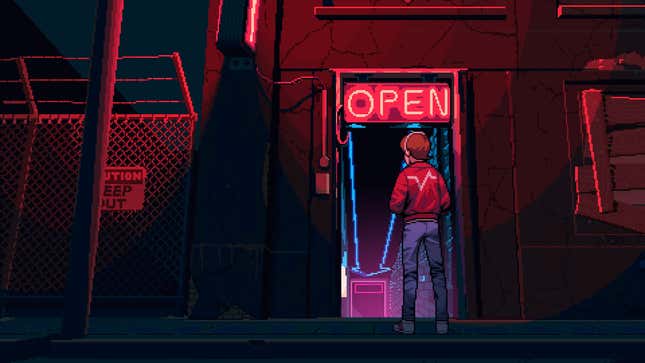
There was a time, I’m told, when arcades were everywhere and kids spent long summer nights pissing away whatever money they had just to lose over and over again in games like Sinistar and Out Run. I missed that period of time by a decade, but that hasn’t stopped me from pining for it, like someone lost in the desert thirsty for water and a shady spot to rest their tired soul.
There’s no shortage of new television shows and video games trying to tap the hyper-commercialized, neon-infused glow of ’80s pop culture, but few resurrect the dream with such pixelated beauty and gaming-centric veneration as 198X, which came to PS4 earlier this summer. Part visual cinematic, part retro-arcade game anthology, the game follows a suburban teen as they navigate the slow decay of their childhood by taking refuge each night in an arcade. With parents who are seperated and bullies at school, the protagonist has plenty of reasons to seek out the games at the arcade, which offer alternative languages through which to interpret and make sense out of growing up.

Each of the mini-games in 198X is lushly animated and controls like a polished recreation of one of the classics. What really grabbed me about the game, though, were the parts in between that play out like animated shorts, usually focusing on the nameless teen’s journey to and from the arcade. In these moments, they explain their increasing alienation from the childhood they used to know—Saturday morning cartoons, a tree house in the backyard, a timeless repetition of familiar familia rituals—and the future life not quite built, represented by the skyline of a city where they seem destined to one day become just another anonymous worker.
The arcade the teen has come to orient their shifting existence around ends up occupying very little actual screen time. Outside of an establishing panning shot, it exists mainly in the teen’s thoughts, occupying them whenever they’re off somewhere else or reflected through the mini-games themselves. These games’ off-screen background sounds, cigarette smoke, and blinking lights fill in a few gaps of what the arcade is like, with the rest left to the imagination of the player.

The funny thing about nostalgia is that while it’s always aimed at the past, it’s a product of the present. We miss things not as they were, but as we now imagined them to be. I’ve heard stories about arcades from friends and family, visited the mostly empty ones that remained at the mall or down the shore long after the rest had closed, but never had anything like the excitement of finally seeing the latest Street Fighter machine delivered, nor did I tend to a high score daily as if it were a beloved pet. In part because I have never done those things, I’m able to imagine doing them free of any of the real-life disappointments, struggles, or mini-tragedies that accumulate like barnacles on the sides of actual lived memories.
198X’s arcade, while the focal point of the game, takes on a similar power by virtue of always being kept at a remove. You can’t explore it as the teen, can’t talk to anyone there, and can’t experience it through watching other people continue to play games long after your pockets have gone empty. It’s like a mirage whose power and hold over your imagination is at its height when it’s furthest from actually being realized. And even if mirages aren’t real, 198X is, and while there’s no arcade on the edge of my neighborhood to walk to on hot summer evenings, the game has given life to that dream in a way that feels equally restoring. It’s no substitute for the real thing, I’m sure, but it won’t ever be at risk of closing either.